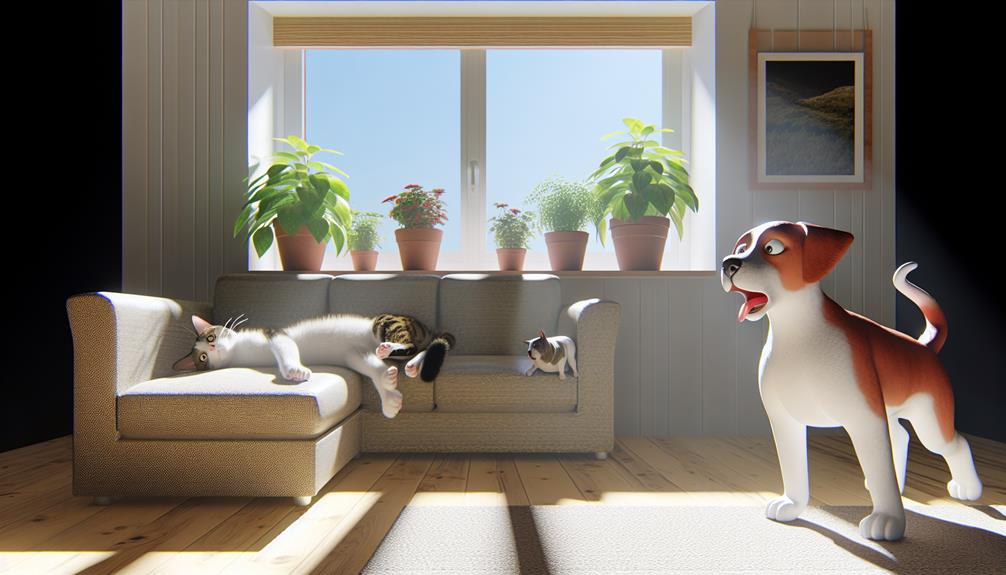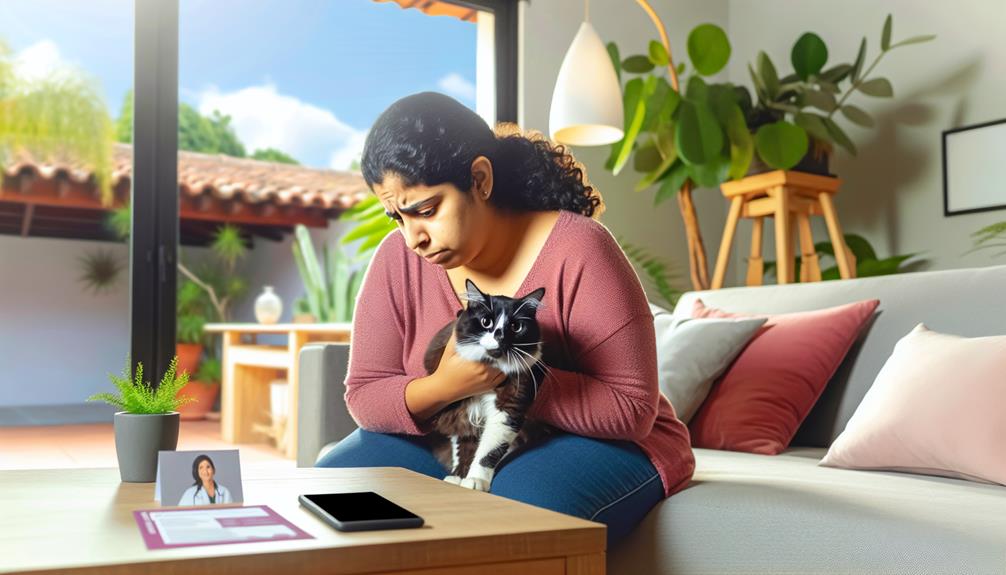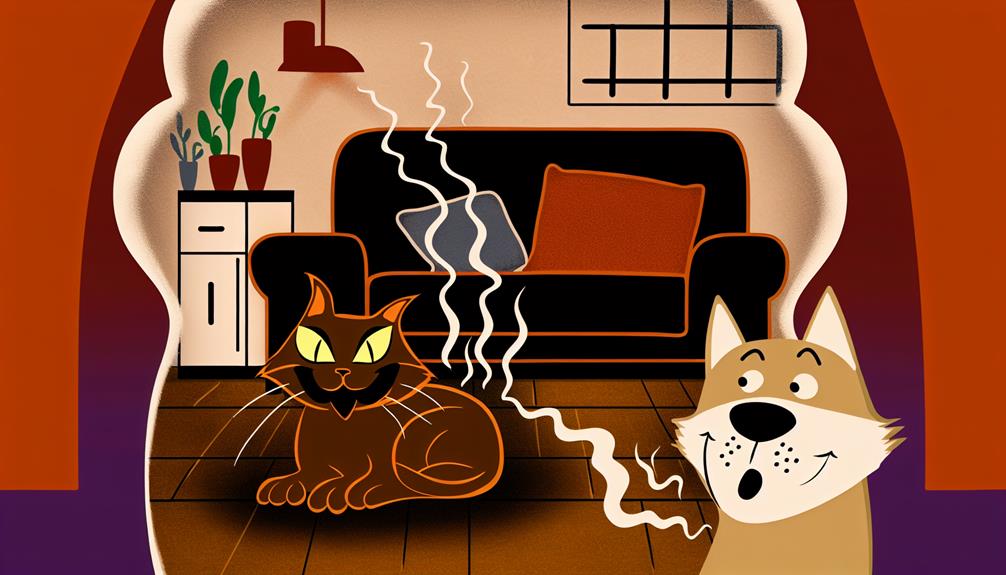When it comes to cats, you'd think they emit more gas than a hot air balloon. While it's certainly not that dramatic, cats do have their moments of flatulence, and understanding why is essential for their health. You might wonder what causes your feline friend to break wind and if it's something to worry about. Knowing the potential dietary and medical reasons behind this can help you guarantee they're comfortable and healthy. But what steps should you take if your cat's flatulence seems excessive? Let's explore the underlying causes and solutions.
Understanding Cat Flatulence
When it comes to understanding cat flatulence, it's crucial to recognize that while occasional gas is normal, excessive flatulence may indicate an underlying health issue. The feline digestive system is a complex network designed to efficiently process food, absorb nutrients, and expel waste. Unlike humans, cats have a shorter and more straightforward gastrointestinal tract, which means their digestion is generally quicker. However, disruptions in this system can lead to the accumulation of gas.
One common myth about cat digestion is that certain foods universally cause flatulence. In reality, cats are obligate carnivores, and their digestive systems are adapted to process high-protein, low-carbohydrate diets. Introducing foods that are high in fiber or carbohydrates can disrupt this balance and result in flatulence. As a result, it's important to provide a diet that closely mimics what they would eat in the wild.
Another gas myth is that flatulence in cats is always harmless. While it's true that occasional gas is nothing to worry about, persistent flatulence may be a sign of gastrointestinal distress. Conditions such as inflammatory bowel disease, food allergies, or even intestinal parasites can lead to excessive gas production. If your cat's flatulence is accompanied by other symptoms like diarrhea, vomiting, or weight loss, it's critical to consult a veterinarian.
To summarize, understanding cat flatulence involves recognizing the intricacies of cat digestion and dispelling common gas myths. By maintaining an appropriate diet and monitoring for any signs of gastrointestinal issues, you can help guarantee your cat's digestive health remains ideal. If you notice any concerning symptoms, seek professional advice promptly to address potential underlying conditions.
Causes of Flatulence in Cats
Several factors can contribute to flatulence in cats, many of which stem from dietary issues. Understanding these causes can help you manage and prevent gas in your feline friend. One major cause is the ingestion of low-quality cat food containing fillers and artificial ingredients that are difficult for cats to digest. These ingredients often ferment in the gastrointestinal tract, leading to the production of gas.
Another significant contributor is the consumption of food too rapidly. Cats that eat quickly tend to swallow air along with their food, which can result in excess gas. Additionally, dietary indiscretions, such as consuming spoiled food or non-food items, can disrupt normal cat digestion and lead to gastrointestinal upset and flatulence.
Moreover, certain medical conditions can affect digestion and gas production. For example, intestinal parasites, inflammatory bowel disease (IBD), and food allergies or intolerances can all contribute to increased gas. It's essential to identify these underlying conditions to manage your cat's flatulence effectively.
Here are some common causes of flatulence in cats:
- Dietary composition: Poor-quality ingredients and fillers in cat food.
- Eating habits: Rapid consumption of food leading to swallowed air.
- Dietary indiscretions: Ingestion of spoiled food or non-food items.
- Medical conditions: Intestinal parasites, IBD, food allergies, or intolerances.
Signs Your Cat Has Gas

Identifying signs of gas in your cat can be vital for maintaining its overall health. Cats, like humans, can suffer from gastrointestinal disturbances, which often result in gas. Being aware of the subtle indicators of feline flatulence can help you address any underlying issues promptly.
One of the primary signs of gas in cats is increased flatulence. If you notice an unusual frequency of your cat passing gas, it could be a red flag. Another tell-tale sign is abdominal bloating. A distended abdomen may indicate trapped gas, causing your cat discomfort. Additionally, if your cat exhibits irregular cat behavior, such as sudden restlessness, frequent stretching, or a reluctance to lie down, these might be attempts to alleviate gas-induced discomfort.
It's important to observe your cat's appetite and stool consistency. Changes in eating habits, such as a sudden decrease in food intake or apparent discomfort while eating, could point to gastrointestinal issues. Similarly, alterations in stool, ranging from diarrhea to constipation, can be associated with gas buildup in the digestive tract.
Some gas myths suggest that all cats invariably show obvious symptoms when experiencing gas, but this is not always the case. Felines can be adept at masking discomfort, making it essential for you to closely monitor any subtle changes in their behavior and physical condition.
Moreover, vocalization changes, such as increased meowing or growling, can be indicative of internal discomfort. Keep an ear out for these auditory clues. Regularly checking for these signs can help you guarantee your cat's gastrointestinal health remains ideal, and any issues are addressed promptly.
Dietary Solutions for Gassy Cats
Addressing your cat's gas issues often requires scrutinizing their diet. Certain foods can contribute to excessive flatulence, and by identifying and eliminating these gassy foods, you can greatly improve your cat's digestive health. Understanding which ingredients are common culprits is essential. Cats have specific dietary needs that, when unmet, can lead to gastrointestinal disturbances.
First, consider the following dietary adjustments:
- Eliminate Dairy Products: Many cats are lactose intolerant. Even small amounts of milk or cheese can lead to bloating and gas.
- Switch to High-Quality Protein: Low-grade proteins or by-products can be harder for your cat to digest, leading to gas. Opt for premium cat foods that list a specific meat source as the first ingredient.
- Introduce Probiotics: A balanced gut flora can aid in digestion and reduce gas. Probiotics formulated for cats can be beneficial.
- Avoid Carbohydrate-Rich Foods: Cats are obligate carnivores and their digestive systems aren't designed to handle high-carb diets, which can cause fermentation and gas.
Monitoring the ingredients in your cat's food is vital. Ingredients like soy, corn, and wheat are often added as fillers but can be particularly gassy foods for cats. Changing to a grain-free diet might also help alleviate symptoms.
Additionally, feeding your cat smaller, more frequent meals can help manage digestive health. Large meals can overwhelm their digestive system, leading to increased gas production.
When to Consult a Veterinarian

Recognizing the appropriate time to consult a veterinarian is vital for your cat's health. While occasional flatulence in cats can be normal, persistent or excessive gas may signal underlying digestive health issues. It's important to differentiate between common flatulence myths and legitimate medical concerns.
Firstly, observe your cat's behavior and overall well-being. If your cat experiences chronic gas along with symptoms such as vomiting, diarrhea, weight loss, or a noticeable decrease in appetite, these could be indicators of more serious gastrointestinal problems. Conditions like inflammatory bowel disease, intestinal parasites, or food allergies often manifest through these signs.
Additionally, pay attention to the frequency and odor of the gas. While it's a myth that all cat flatulence is foul-smelling, particularly strong or persistent odors could suggest a dietary intolerance or imbalance in gut flora. A veterinarian can conduct clinical assessments such as fecal examinations, blood tests, or imaging studies to diagnose the root cause accurately.
It's also important to take into account the role of your cat's diet. Abrupt changes in diet, low-quality food, or inappropriate human foods can disrupt digestive health. If you've tried dietary adjustments without improvement, it's time for professional guidance. A vet can recommend specific food trials or hypoallergenic diets tailored to your cat's needs.
Lastly, never ignore sudden changes in your cat's digestive patterns. Early intervention can prevent minor issues from escalating into severe health problems. Consulting a veterinarian guarantees evidence-based solutions to safeguard your cat's digestive health, debunking flatulence myths and providing peace of mind.
Conclusion
So, if your feline friend is turning your living room into a gas chamber, it might be time to reassess their diet or consult a vet. Sure, it's hilarious when Fluffy lets one rip during a serious movie scene, but excessive flatulence could be a sign of something more sinister. Keep an eye on their digestive health, opt for quality food, and don't hesitate to seek professional advice. Your nose—and your cat—will thank you.
